Veterinary Economic Development: Volunteering with Veterinarians Without Borders in Liberia
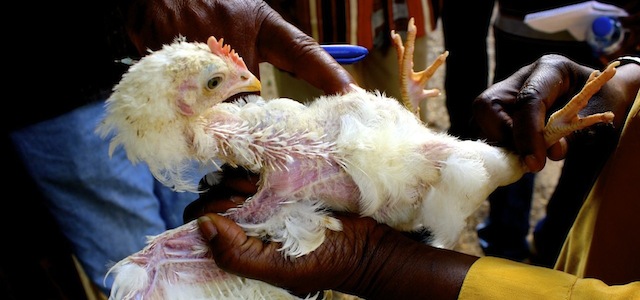
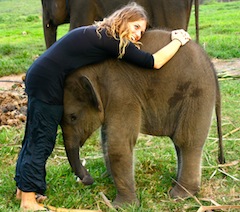 This past January, I volunteered with Veterinarians Without Borders U.S. for three weeks in Liberia, West Africa on a project to improve their agricultural sector. Specifically, I helped teach a poultry production and health management course to local farmers and Ministry of Agriculture workers.
This past January, I volunteered with Veterinarians Without Borders U.S. for three weeks in Liberia, West Africa on a project to improve their agricultural sector. Specifically, I helped teach a poultry production and health management course to local farmers and Ministry of Agriculture workers.
Liberia’s Background
Liberia is a post-conflict zone, and when Liberians migrated to urban areas or emigrated to avoid the civil wars (1989-1996 & 1999-2003), the agricultural dynamic changed significantly. Liberia is currently more than 90% dependent on imported food, when their climate and landscape could easily sustain livestock and crops to support their own country. Part of this is a negative stereotype associated with farmers or “country” people.
Interestingly, Liberia is one of the only African nations that does not have an ethnic group or tribe associated with raising livestock. Although we are still in the process of establishing a lasting program in Liberia, it was extremely rewarding to teach sustainable (and local) methods to ensure public safety and improve livestock production. Not to mention that the weather was hot and dry, a welcome reprieve from an upstate New York winter.
The Project: Poultry Husbandry & Medicine Training
I was accompanied by Dr. Jarra Jagne, DVM, DACPV, and together we taught poultry husbandry and medicine, with hands-on learning as an essential component of the curriculum. Specific topics included background on the global poultry industry, biosecurity, raising chickens and turkeys, hatchery basics, poultry housing (emphasis on tropics), brooding, the growing period, production and records, poultry nutrition and vaccination / immunity.
We also lectured on viruses, bacteria, mycoplasmas, parasites, fungal diseases, and nutritional diseases. Participants performed necropsies and outbreak simulations to reinforce a working knowledge of the skills we taught, especially biosecurity.
Working in West Africa also offered a unique opportunity to witness various “foreign” diseases, such as peste des petits ruminants as one example. We also took advantage of any clinical cases that were found (not just in poultry, but small ruminants and pigs as well) as a teaching opportunity.
Daily Schedule
Every morning we would have breakfast together, which was pretty heavy and consisted of potatoes or soup. During the first two weeks, lectures filled the morning (although we always had a short break mid-morning for tea). Lunch was always stew over rice and never failed to surprise me.
I am an adventurous eater, and I will try most things once. I did discover however, that when I find beef tongue, chicken feet and goat rumen all in one lunch that I tend to set it aside in search of something else (haha). Lectures filled our afternoon and we wrapped up by mid-afternoon for everyone to enjoy their evening.
The last week our days were consumed by farm field trips, group work evaluating the farms and applying what we taught, and outbreak simulations to test their practical knowledge of biosecurity. Each day was new and exciting and I loved every minute of it.
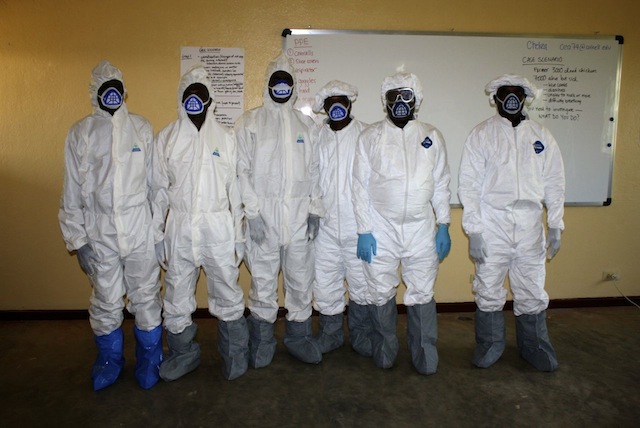
The Benefits
It was great to see that participants were hungry for this knowledge. Although most had agricultural experience or some education, they had never been taught poultry husbandry or health management.
Since poultry is a relatively easy source of protein, our course was received with enthusiasm. Many citizens of Liberia are malnourished, particularly outside of the main cities where lack of infrastructure prevents goods from reaching most villages.
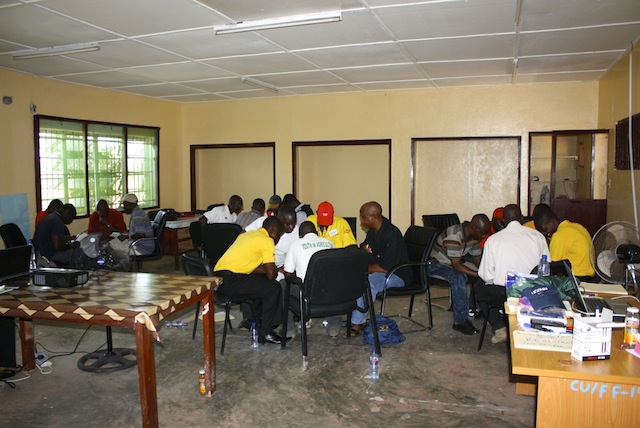
The Challenges
Despite the positive reception we received for our time spent in Liberia, working in international development and public health is an uphill battle. There is a paradigm shift between the ‘foreign aid’ mentality of bringing physical products or money, and the more sustainable position of teaching others skills and using local resources to support growth.
I have witnessed firsthand many of the problems and challenges that occur daily in this field, and it has set a burning passion in me to improve veterinary medicine in developing nations as it pertains to public health and food sustainability.
Specifically in Liberia, large poultry farms do not exist, so we could not evaluate biosecurity or production at this level. A huge challenge is the lack of a feed mill that produces balanced poultry feed. Those who do own poultry travel to Côte d’Ivoire, Guinea or Sierra Leone to purchase adequate feed. They do the same to purchase chicks from reasonably reliable hatcheries, where vaccination protocols are in place.
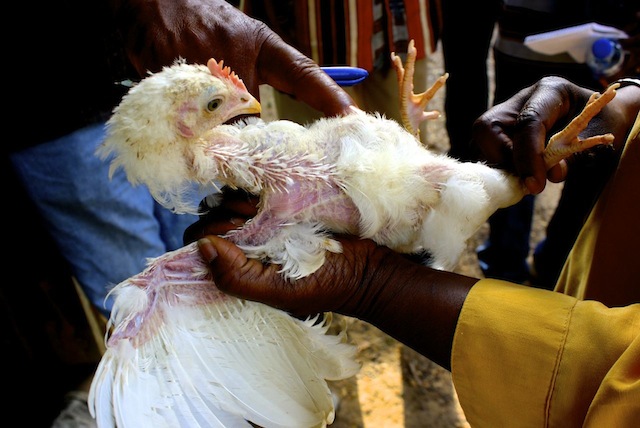
Some non-governmental organizations have tried to help by bringing in genetically modified chickens that are high producers, but they do not thrive in this environment and have left those farmers with birds they cannot sell. Since the farmers invest their own money in housing and feed, even when these particular birds are donated, they end up doing more harm than good.
This just reinforces the fact that development work has to be sustainable, using local resources, and follow-up is key. Despite these roadblocks, our participants were eager to apply what they had learned and start their own backyard poultry operations.
The Future
International veterinary medicine is an important job field for veterinarians to consider after graduation, and one that is often overlooked. As disease burden, foreign animal diseases, and zoonoses plague communities and the global economy, there is a critical need for veterinarians trained in international development.
It is essential to share current veterinary knowledge with developing countries, particularly as it pertains to the growth of agricultural sectors and the sustainability of the country. Liberia in particular is gaining support and there will be many veterinary opportunities in the future.
I really enjoyed the opportunity to work with Veterinarians Without Borders U.S. (follow them on Facebook here), especially on a project with immediate gratification—teaching sustainable and local methods for poultry production and health management. I would encourage anyone with an interest in international development and veterinary medicine to seek out any opportunities that present themselves.
You may encounter challenges, but every experience will reveal something that opens your mind and allows you to work more easily with different cultures.
So what are you waiting for?
Elliott here again: Thanks to Chelsea for sharing about this unique experience! This type of agricultural development training can make a big difference, and it’s something that I’m pretty passionate about too. You can read about my experience working on a similar project in Mozambique here.
Do you have any questions for Chelsea or me about her experience? Interested in setting up something similar for yourself? Let us know in the comments here!
[google-map-v3 width=”350″ height=”350″ zoom=”4″ maptype=”roadmap” mapalign=”center” directionhint=”false” language=”default” poweredby=”false” maptypecontrol=”true” pancontrol=”true” zoomcontrol=”true” scalecontrol=”true” streetviewcontrol=”true” scrollwheelcontrol=”false” draggable=”true” tiltfourtyfive=”false” addmarkermashupbubble=”false” addmarkermashupbubble=”false” addmarkerlist=”Monrovia, Liberia{}university.png{}#http://www.elliottgarber.com/veterinarians-without-borders-in-liberia/ Volunteer with Veterinarians Without Borders in Liberia#” bubbleautopan=”true” showbike=”false” showtraffic=”false” showpanoramio=”false”]

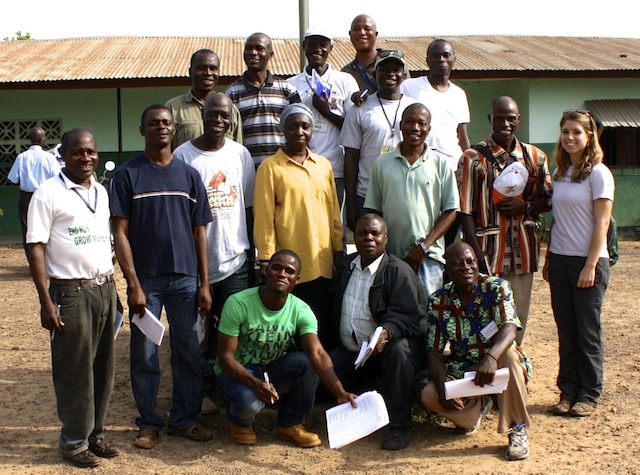
Comments
This is absolutely awesome! I’m currently an MPH student, in hopes to attend Vet school once I complete this graduate degree. Do you know if someone like me could participate in a program like this??
Hey Marie, I think it would depend on a case-by-case basis, but in general, yes, I’ve found that organizations like this are very willing to take pre-vet volunteers. Your public health training would make you that much more of an asset!
Hello, Marie! I work as a program manager for Veterinarians Without Borders. Public health people with veterinary background are valuable in this type of work. I would suggest you contact VWB directly at vwb.usa@gmail.com for more information.
Chelsea is amazing, and did very nice work in Liberia. It is a lot of work both in preparation, time teaching and in the detailed report that is required following the course work. Chelsea and Dr. Jagne were a stellar team!
Carrie La Jeunesse, DVM
Thanks for chiming in, Carrie!
Chelsea also just let me know some more details about the funding of her trip.
Her airfare was covered by Veterinarians Without Borders because the original funding grant included a student assistant.
Housing was provided for free on the site of the training.
Most other expenses were covered through the American Association of Avian Pathologists (AAAP) Foundation’s Eskelund Preceptorship:
http://www.aaap.info/kenneth-h-eskelund-preceptorship-program-
See, it is possible to do this kind of thing without diving into your own non-existent savings!
Thanks for revisiting this post in your recap of 2013! I’m a second year veterinary student at Ohio State. I have stumbled upon this website but was unsure of who to contact about potential opportunities. Dr. La Jeunesse, would it be possible to use that email address you’ve provided above to contact them about this summer? Thanks!
Hey Sarah, go ahead and try that gmail address linked above, but if you don’t hear anything after a while let me know and I can try to track down a better contact for you. Good luck!
Hi, Sarah. Yes, that’s the correct email address.
Nice ELLIOT for all the great vet work. i can help actively also when contacted on this noble course.
thanks